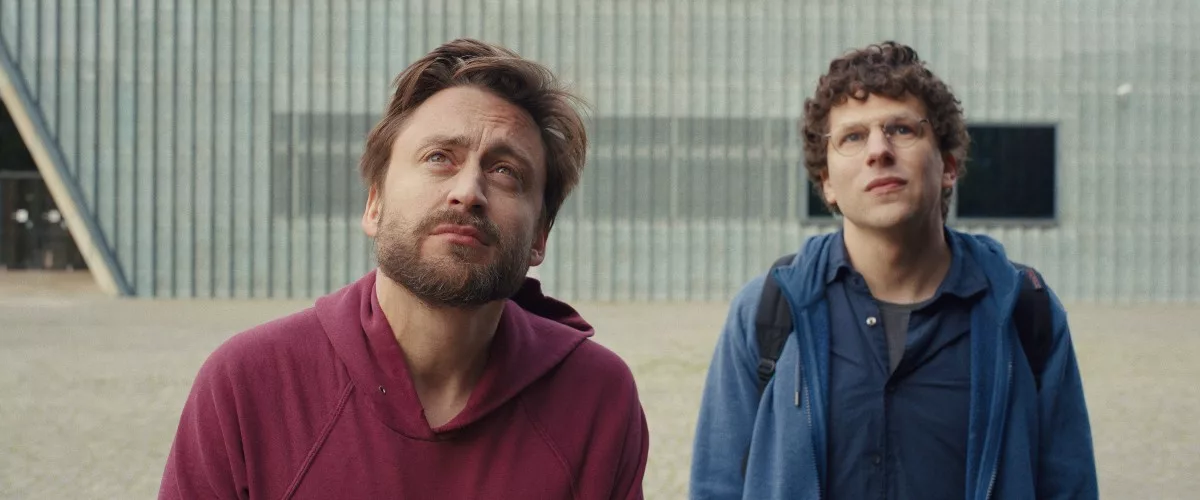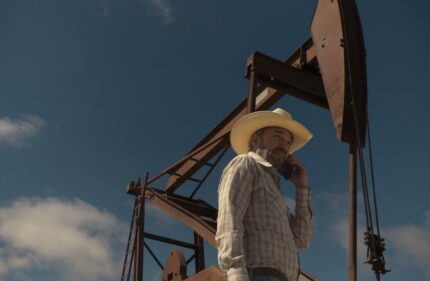We are all merely tourists when it comes to someone else's pain. That shouldn't be taken as a knock on the importance of compassion and empathy. On the contrary, they seem more essential now than ever. But there are limits to how much we can really put ourselves in someone else's shoes. Being a witness, being an ally, just being a shoulder to cry on—these are the things that connect us and make us human, but everyone has a different emotional language built on years of experience that we can cushion from the blows of the world but never fully speak. This truth is at the core of Jesse Eisenberg's masterful "A Real Pain," a story of two cousins traveling to a place where unspeakable pain was inflicted on humankind as they battle their own personal demons. On the surface, it's an oil-and-water tale about two men who are practically brothers but have lived remarkably different lives—one a rushing fountain of emotion, the other going through more traditional patterns of existence. Both men want to be like the other one. Eisenberg's film movingly and brilliantly understands how they can't.
David (Eisenberg) and Benji (Kieran Culkin) have booked a trip to Poland to learn about how the Holocaust impacted the region through the lens of visiting their grandmother's hometown. A survivor herself, grandma recently passed, leaving her BFF Benji in one of those emotionally adrift chapters that we all face at different points in our lives. The cousins who are so close in age that they are practically brothers join a tour group led by the engaging James (Will Sharpe) that also includes four other travelers played by Jennifer Grey, Kurt Egiywan, Liza Sadovy, and Daniel Oreskes. Everyone here feels like they existed before they arrived in Poland and will go back to their lives on the tour's completion. One of the many wonderful things about Eisenberg's excellent script is that he refuses to use the other tourists as emotional pawns. There's a much worse version of this film that gives each tour member problems for Benji or David to fix. And yet they're not just background either—they enhance the overall veracity of the piece.
Most people won't notice because they'll be so entranced but what the Emmy-winning Culkin does in this film. In easily one of the best performances of 2024, he plays a guy we all know (or were at some point in our lives): the friend or relative who we can't stand under certain circumstances and yet secretly want to be more like even at his worst. Culkin is so raw and organic, sketching Benji in a way that never once feels calculated. Despite watching him for hours on "Succession," the actor fades away almost instantly into this role, and we believe every choice that he makes. He finds a way to convey an inner monologue that Benji may not even fully understand but that comes out through his eyes, body language, and tenor.
What truly elevates "A Real Pain" is that Eisenberg the writer/director never pities Benji but doesn't put him on a pedestal either. He's a pain in the ass. But he's also not really wrong when he has an emotional outburst over the discomfort of taking a train to a concentration camp or lashes out at James for spitting out facts instead of actually connecting with locals in the towns they visit. That scene is a true standout, a moment that distills the complexity in the emotionally raw existence of Benji. No one ever criticized the obviously likable and informed James before, making it easy to look at Benji as a troublemaker, but he's just being honest about his emotional response to what's around him. Where's the flaw in that? Why are so few of us willing to express those difficult emotions? Isn't burying them the real cause of pain?
Culkin's performance will be the touchstone for adoration of this film, but Eisenberg's work as a director and writer shouldn't be overlooked. He uses music beautifully and delicately, memorably dropping his score from the mix while the tour is at a concentration camp, a place where the silence says so much more. He shapes the relatively slight story of his film perfectly, paring it down to a 90-minute production that has no fat but also feels totally complete. He shoots Poland with respect and admiration, never succumbing to the travelogue approach to traveling Americans that can derail a film like this. Every time that "A Real Pain" threatens to become maudlin or sentimental, Eisenberg's choices ground it.
And that grounding is what makes it so powerful. In the end, it's about two people who have drifted apart as their lives have gone in such different directions. But they still love each other. You can feel it in every frame. David has a wife and child he misses at home, but he worries that Benji will return to loneliness, even though he's the first person to make friends in any new location, someone who is honestly interested and engaged in other people's stories. In just 90 minutes, we come to know David and Benji like they're our own friends or cousins. Even if we can't fully feel their emotions, we see elements of our own within them. It's a powerful feeling to witness art that reminds us that all aspects of our existence are valuable, especially our pain.


















